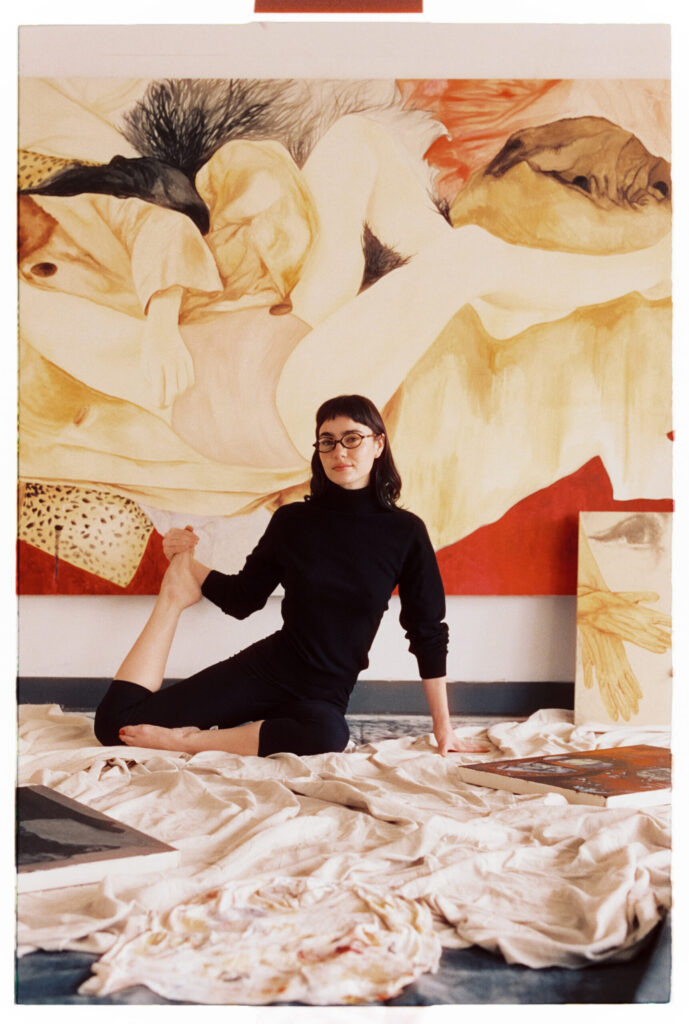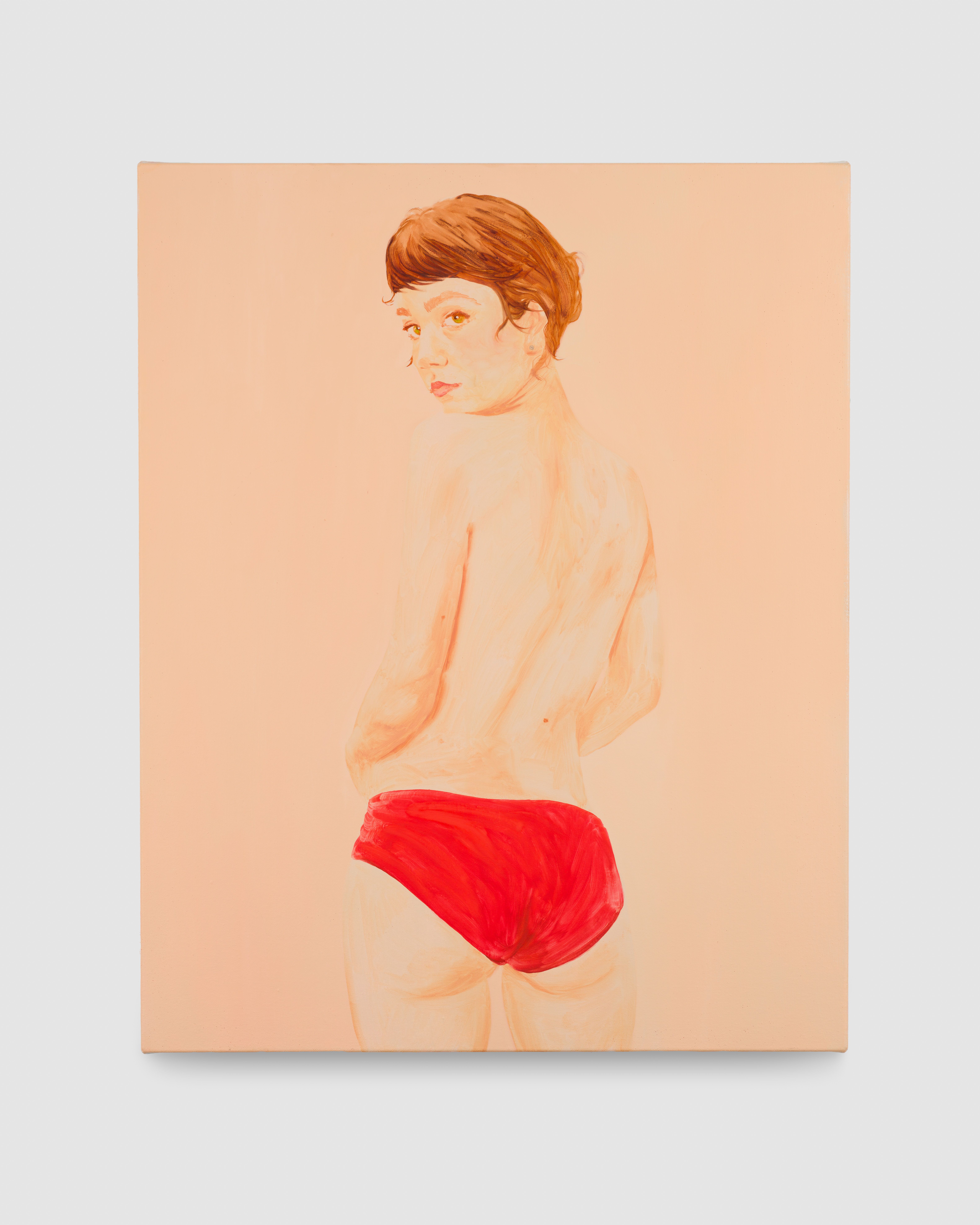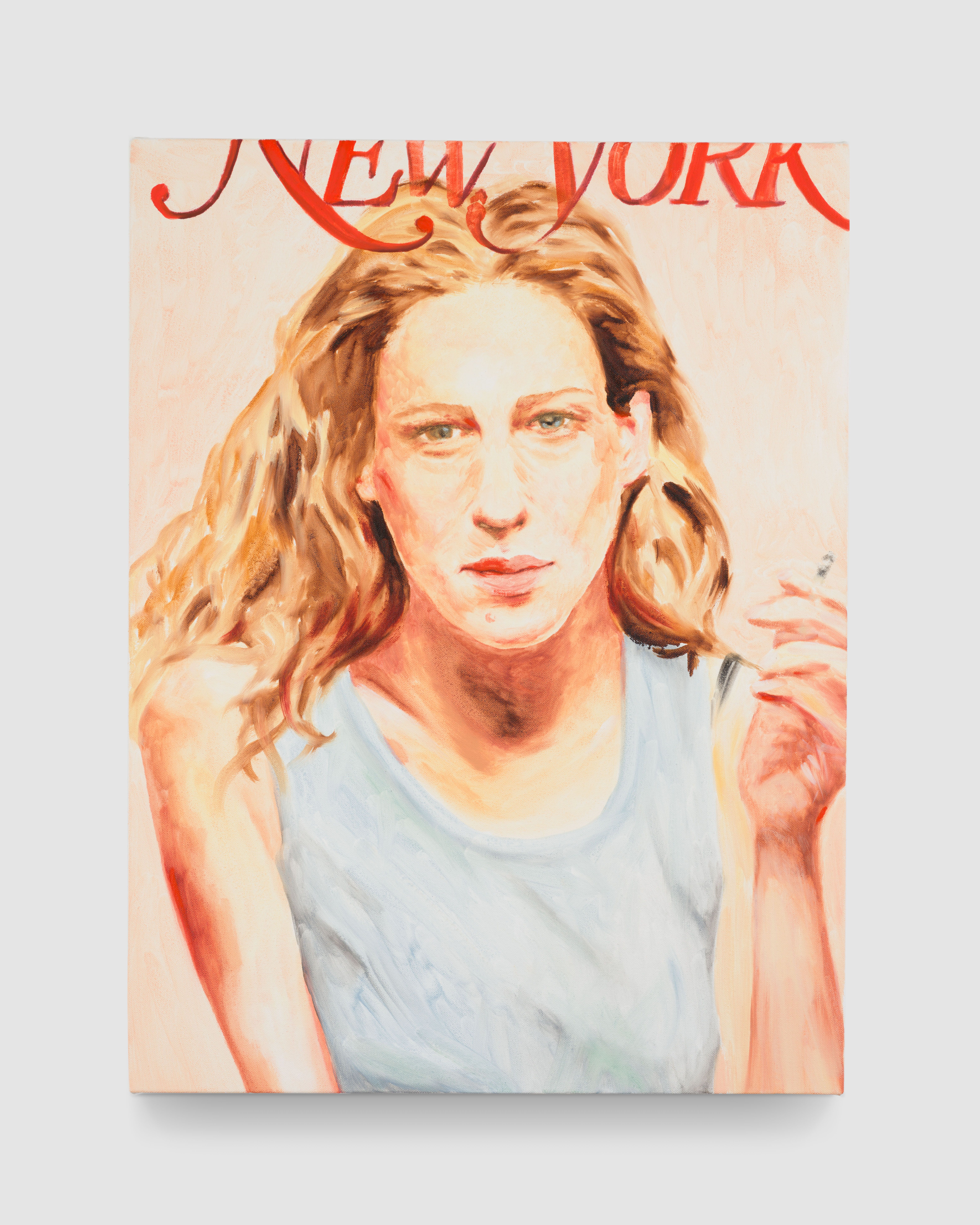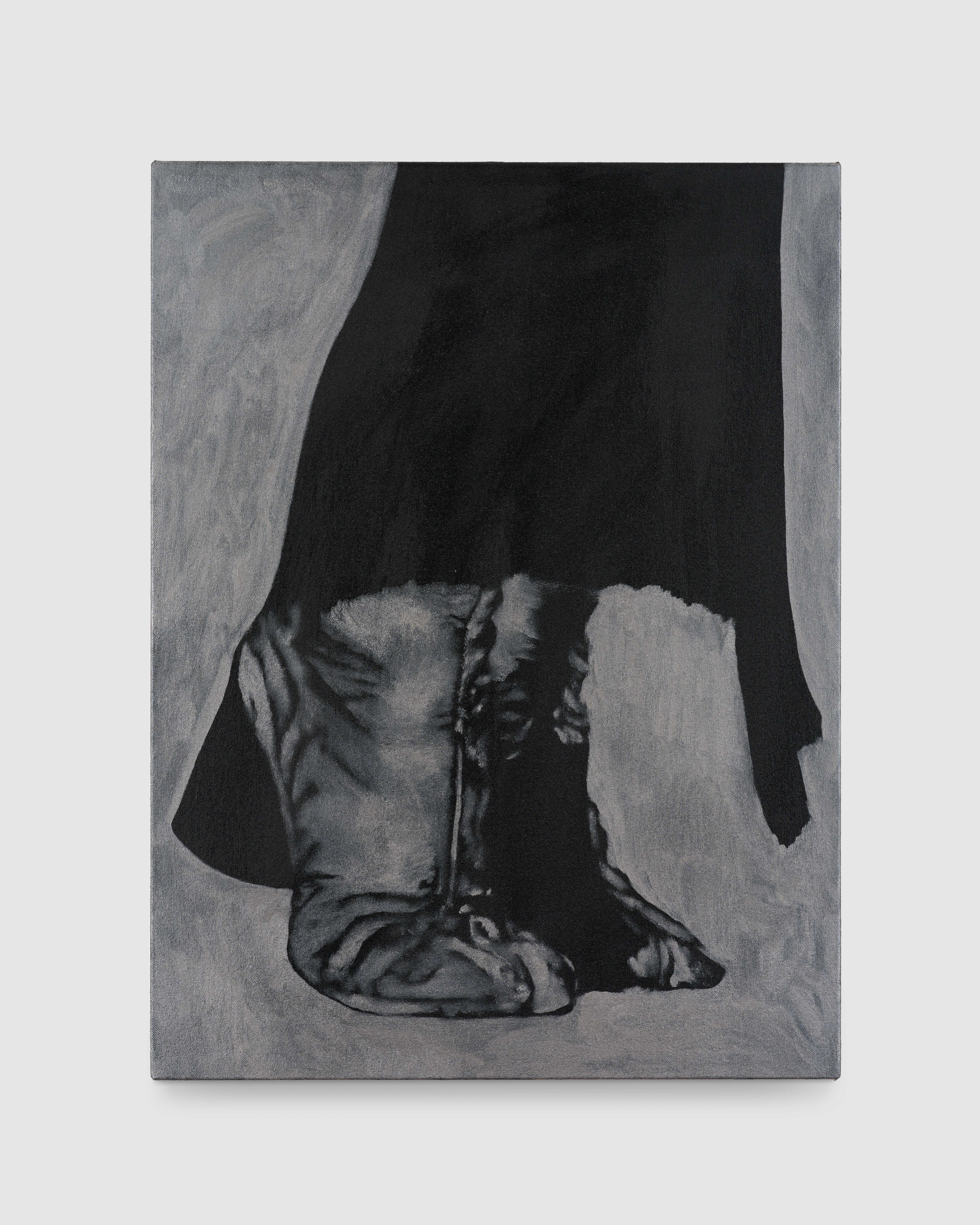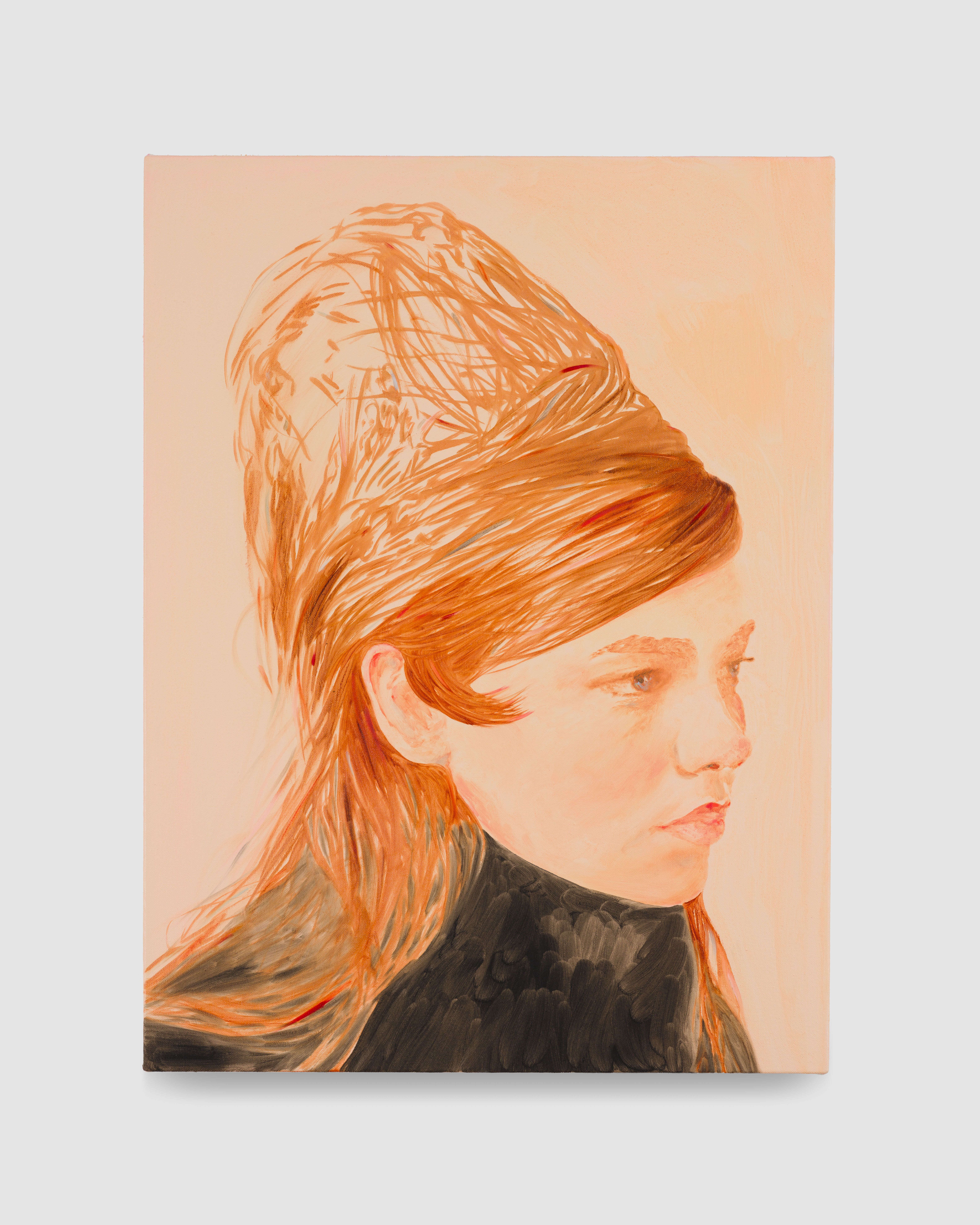When she named her exhibition at Nicodim Gallery It Girl, the L.A. based artist Emily Ferguson was being tongue in cheek. “I don’t know exactly what makes an it girl,” she says. “In fact, it’s not even about the literal girl.” The term is splattered everywhere online and IRL, occupying a glossy, branded space within the feminine sphere that’s simultaneously aspirational, all-encompassing, vague, and relatively meaningless. But in Ferguson’s series, she intermingles honest, warm, and delicate self-portraiture with paintings that capture the domestic everyday and make meta-pop cultural references to Carrie Bradshaw. And maybe even subconsciously, Ferguson is offering herself, and the hypothetical “it girl,” something she could only be given in hindsight—a maternal kind of care, kindness, and healing. Before the show opened earlier this month, she and I got on Zoom to discuss her circadian painting routine, rebellion, and being honest with herself through her art.
———
MARIA SANTA POGGI: How are you?
EMILY FERGUSON: I’m good. It’s absolutely disgusting out here in L.A. You guys have rain right now too, so it’s just a hot mess.
POGGI: It’s alternating between sun and rain and gross. It’s the best combination.
FERGUSON: It’s also the most bipolar weather I’ve ever experienced and I’ve lived in California my whole life. I feel like it’s been the same in New York. Whenever I’ve been in town, I think I’m packing for a sunny week and then boom, it’s freezing. Global warming is so real.
POGGI: It is, and we’re all going to die.
FERGUSON: Yeah, it’s impending doom. Every morning when you wake up and you look out the window and it’s gray again, then it’s sunny in two hours, I’m like, “Okay.” I don’t know about you, but my mood fluctuates with the weather.
POGGI: The days it’s bad, I’m depressed. And the days it’s good, I’m like, “Hello, world.”
FERGUSON: It’s weird. My friends all have a joke. If it’s raining, I don’t leave the house. I’ll do anything I can to not leave the house. I used to call out of work. All I want to do is be in my jammies and watch Real Housewives.
POGGI: You know what? I’m the same way. I cope through reality TV.
FERGUSON: It’s my weakness. I love it. I live for it. It’s so bad.
POGGI: Does the Real Housewives ever inspire your art?
FERGUSON: I think that it’s just a voyeuristic thing. It’s more escapism for me. I think there is a stigma that if you’re an artist, you’re meant to be ingesting cerebral content all the time. And that’s false. It’s been really refreshing, seeing a lot of artists talk about how much they need to escape sometimes. I see it as a way to check out of my brain and leave my workday behind.
POGGI: How much time do you spend in the studio?
FERGUSON: Usually I go Monday through Friday. I do my best to give myself routine. It’s really hard when you first start to have to make your own schedule. You’re like, “This is so freeing, this is so great.” It’s like the meme where it’s like, “I quit my full-time job to be freelance and now I work 24/7.” So it does take a lot of discipline and also a lack of discipline. You’ve got to find your balance so that you feel like a normal human. I like to get there in the morning. I have a weird thing about having to get there before 11. I don’t even have studio nighttime lighting because I like to work with natural light. I really work with a circadian clock.
POGGI: Well, I feel like you can tell through the It Girl exhibition that there’s this brightness to a lot of the pictures.
FERGUSON: Really light. I paint really light and really soft and I like to paint off the cuff and during the day, when things are brighter and lighter. I really try to avoid nighttime. Five o’clock is the witching hour. My juices are out, and I feel like that’s when I have to tap out. If I keep my working time in those hours where it feels light and bright, then my spirit feels light and bright. Then, it’s translated into the work.
POGGI: How much do you think that affects your art?
FERGUSON: I knew, going into the show, that I had this time constraint, which I actually really enjoy. I love having something laid out, a framework to work within. It allows me to create my own little schedule. I can’t give myself a precise moment, an amount of time for each piece, but I could be like, “This week I’m going to start a big painting.” The show felt like a joy. It was actually really relaxed. I went in feeling like, “Okay, I’m going where the wind takes me. I have a light framework, and then I’m just going to let it go.”
POGGI: In the series, there’s this mixture of self-portraiture and also pop culture references or things that are tied into these ideas of what it means to be an it girl. I’m so curious about how you chose to zoom in on certain references.
FERGUSON: I went into this show feeling like, “I want to have no rules.” That was a big thing that went in my head. I was thinking about the reference to Carrie Bradshaw. Well, everyone is a little Carrie. Everyone sees mirrors in media. I think we also look to insert ourselves in fictional narratives, to seek asylum from our own lives, or find comfort in the reflection of ourselves. A lot of the pop culture references came from those feelings. Everything can be a self-portrait. And then the literal self-portraits were tied into that idea. It was more about a vessel for a feeling than it was about literally being myself. It was more like, “How can I convey a feeling, and what vessel can I use?” Maybe it’s a Carrie or a Nico or another well-known figure. It’s got nothing to do with comparing myself to these figures, but instead translating the emotion.
POGGI: That’s so fascinating to me, especially because the concept of an it girl is itself such a paradox, especially to girlhood. I was wondering if you could speak on the it girl ethos a bit and what made you use it as a focal point? It’s all intertwined and all mirrored.
FERGUSON: I don’t think my aim was ever actually really to explore the idea of a literal it girl. I think the title is actually meant to be more ironic or satirical in nature. I don’t know exactly what it is that makes an it girl. In fact, it’s not even about the literal girl, it’s more like… what even is this enigmatic aura that we’ve created. It’s a buzzword definition that defines a feminine experience? Or where do we draw our inspiration from? What informs our own female identities? Really, it was more like a cheeky thought than it was a literal interpretation.
POGGI: Looking at the paintings, I couldn’t help but think about how women and girls are conditioned to aestheticize or brand themselves in this day and age. But what does that really mean? What does that mean to you?
FERGUSON: To be honest, it was almost a rebellion against that. I try not to pay too much mind to that side of things. I’m really not that connected media-wise, especially when I’m working. It’s really easy to get consumed. Brands use these hot buzzwords like “ballet-core” to put a language to something that’s actually a lot more nuanced and complicated. I think that’s the media’s job, but it’s much more indescribable. There’s a lot of glamor and a lot of vanity in that end of Hollywood and the way that women see themselves portrayed, but there’s a much greater story behind it—and that was what the show was about. Here’s all this iconoclasm, all these images. But what does it really mean? It was supposed to touch on that nuance.
POGGI: There’s such a warmth to your paintings, too. We always hear about the male gaze, but they evoke this idea of a maternal gaze.
FERGUSON: That’s a really great point because, first of all, aesthetically, I lean very warm. I’m a very warm and fuzzy person. I have a family of very warm and fuzzy women, so I am always cocooned by that energy and I really like to bring that to the table. I’m using the sunlight. I try to paint very true to the subject and not change things too much. The way that we hear the term “mother” now, in pop culture, I love it. I wanted the paintings to mother or nurture this feminine spirit. I see that as a really beautiful thing to lean into. You can feel it when you go into a bathroom full of chicks. It’s this feeling. And I wanted to translate that through warmth.
POGGI: When you’re painting yourself, do you feel like mothering in some way, or healing something?
FERGUSON: Wow, I love this question. I never thought of it that way, but I guess in some ways that’s really true. I hadn’t painted myself until this year and it was really an off-the-cuff thing. I was in a rut and struggling to identify with found imagery, which is something that I’ve always worked with. I was a big Tumblr girl and all of that goodness. I was like, “Okay, I’m feeling really stuck with this. I’m not seeing myself. I’m not seeing my vision. Let’s go back to basics. Let me do something really vulnerable and really crazy and see what happens.” I started the first self-portrait in my last show with no intention of showing it, and I actually do feel like it was very nurturing or maternal to my own spirit too. I want it to feel like this is me looking in a mirror and painting what I see, not what I want to see or what I know. That feels kind of corny, but it’s a way of getting back to the root and asking, “Okay, how do I nurture or mother my creative spirit?” And that, in turn, allowed me to find myself in the found imagery again.
POGGI: It’s funny you say that, because this whole concept of it girls is about marketing ourselves. Girls are being marketed to themselves in a way that’s dishonest, so it makes sense that you’re getting in touch with yourself again.
FERGUSON: It’s so true. It’s about being really honest with yourself. I think that there is a very nuanced and very complicated and complex shared emotion that anyone who identifies as a woman can tap into and feel. I think, subconsciously, that was what drove all of this work. That is the through line.
POGGI: Looking at the series, I felt like someone was holding my hand.
FERGUSON: Thank you so much. The show is for the girls, in a way. My girlfriends inform my work. They’re all different people. Not all my friends are artists. Not all my friends are creative in a literal way. But they all have all these interesting qualities about them. We can be so different, but we’re really all looking at each other.

